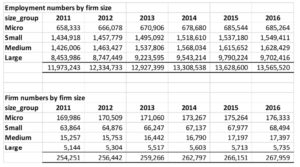South Africa’s unemployment rate decreased by 0,4 of a percentage point to 27,1% in the 4th quarter of 2018 compared to the 3rd quarter of 2018 according to the latest Quarterly Labour Force Survey released by Statistics South Africa.
At this stage in South Africa where government and large corporations can no longer take the lead in creating jobs, it falls to the SMME businesses to step up and play a role in job creation.
The Small Business Institute conducted a baseline study of small businesses in South Africa as there is no reliable data on the number of formal micro, small and medium employing enterprises in South Africa.
The results of their study reflect:
While large companies still employ the most people in South Africa, there are more firms, by numbers, in the SMME environment. The high-level findings from this study are:
- While formal SMEs contribute nearly 98.5% of the number of formal firms in the economy, they only account for 28% of the jobs. Based on international trends, this should be about 60 to 70%.
- Small firms pay more to retain staff than the larger firms (as a percentage of turnover) but are not employing people at a desirable rate.
- The preliminary analysis on labour productivity (turnover per worker) and employment costs (wages) suggests that, unlike in many other similar countries and what might have been the case previously in South Africa, across many sectors smaller firms have higher labour productivity and employment costs than larger ones. What this means is that, on average, small and micro firms pay better and have more turnover per person employed than larger ones. These also seem to be increasing faster over the recent past than those for larger firms. These results suggest that formal small and micro firms – at least over the past five years – are not where jobs for the lower-skilled are being created in the South African economy. Rather, it suggests that small South African firms are becoming more skill-intensive.
Bearing in mind that the above data dates back to 2016 and the South African economy in 2019 is under stress and not growing, what are the factors that impact the SMME increasing employment numbers.
The past and current literature suggests the labour legislation in South Africa is about job protection and hence creates huge costs for small business which bucks the global trend of small businesses being the major employer. As Joan Evans, editor with the Free Market Foundation highlights: endless government red-tape and minimum wages that are too high for small businesses to pay may protect existing employees but ultimately end up punishing the many millions of people who are looking for jobs. This applies, particularly, to semi-skilled or unskilled people and individuals who don’t have work experience and need some training before they can find employment with a bigger organisation. It’s not just small organisations that are putting off expansion plans and therefore not opening more job opportunities. Large companies are being deterred from implementing plans that will inevitably create jobs, as a result of South Africa’s labour laws.
A report on SMME access to finance, conducted by Finfind, identifies access to funding as a major hurdle for many formal micro, small and medium enterprises (SMMEs) in South Africa.
Without finance, the probability of business growth and the creation of this number of jobs is unlikely.
The problem is not a lack of funding, there is a lot of finance available for viable SMMEs – the issue being able to access it. The Finfind report highlights some of the key obstacles that SMMEs need to overcome to do this and similarly, it also emphasises areas that funders need to address, to ensure that many more finance applications are approved for this vital sector,” Darlene Menzies, CEO of Finfind said. However, we as Onpro Consulting have found that there is a lack of funding in certain niche markets of the 4IR as South Africa is not ready to enter that market.
Ignoring that for the moment, if the SMME had the correct funding and had access to funding and each of the micro and small enterprises identified in the 2016 study created one additional job, and the medium enterprises created and additional 2 jobs, that would translate to 5,49 million new jobs, hence reducing the unemployment rate, reducing poverty, reducing the drain on the South African government in the form of welfare grants and providing dignity to those currently unemployed. Having more people employed usually brings other advantages like reduction in the crime rate, stimulation of the economy, etc.
So how do these SMME create new sustainable jobs? My opinion is as follows:
- Having the economic CODESA that Clem Sunter has been calling for since 2015
- Ensuring that GAAP for SMME does not add additional red tape
- Access to funding
- Ensuring that Government, municipalities and large corporations pay SMME in 15 days from invoice and not 120 days as we have experienced.
- Understanding that digital transformation does not necessarily lead to job loss but rather job transformation as different jobs are created along with re-skilling of the existing workforce.
But SMMEs still need the Minister of Trade and Industry, Minister of Small Business Development, Minister of Labour, Minister of Cooperative Governance and Traditional Affairs, Minister of Science and Technology, Minister of Finance, Minister of Economic Development amongst other and labour unions need to come to the party not for their political party nor their unions but for the benefit of South Africans as a whole. The question is who would be the facilitator of this discussion that would be trusted by all parties? Clem Sunter, Thuli Madonsela?
The fact is, does it really matter – should we not rather have it? We have to be better off than we are currently.

